冀教版英语九年级全册Unit 2教案
- 格式:doc
- 大小:83.00 KB
- 文档页数:5
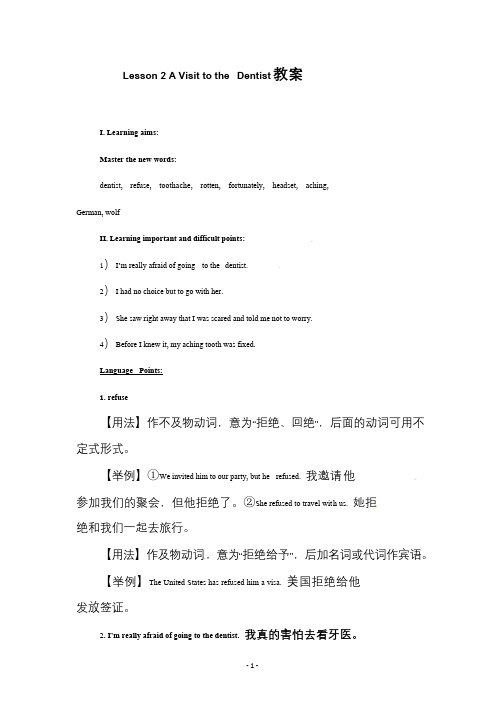
Lesson 2 A Visit to the Dentist 教案I. Learning aims:Master the new words:dentist, refuse, toothache, rotten, fortunately, headset, aching,German, wolfII. Learning important and difficult point s:1)I’m really afraid of going to the dentist.2)I had no choice but to go with her.3)She saw right away that I was scared and told me not to worry.4)Before I knew it, my aching tooth was fixed.Language Points:1. refuse【用法】作不及物动词,意为“拒绝、回绝”,后面的动词可用不定式形式。
【举例】①We invited him to our party, but he refused. 我邀请他参加我们的聚会,但他拒绝了。
②She refused to travel wit h us. 她拒绝和我们一起去旅行。
【用法】作及物动词,意为“拒绝给予”,后加名词或代词作宾语。
【举例】The United States has refused him a visa. 美国拒绝给他发放签证。
2. I’m really afraid of going to the dentist. 我真的害怕去看牙医。
【用法】句式be afraid of 意为“害怕……”,后加名词、代词、动名词作介词of 的宾语。
【举例】①My little sister is afraid of cats. 我的小妹妹怕猫。
②Tony is afraid o f coming out at night. 托尼害怕在晚上出来。


Unit 2 Great People Lesson 10 Touch the World知识目标单词planetary,writer,educator,blind,deaf,illness,ability,progress,community,greatly词组in group of,well-known,at the age of,a high fever,be filled with,make progress句型Helen Keller,the well-known writer and educator,died yesterday at the age of88.She had a high fever that made herblind and deaf.When she was nineteenmonths old,Helen fell ill.Anne was filledwith pride.技能目标能听懂本课时的听力材料,能说出本课时的重要句型,能运用句式用英语谈论学习方法掌握本课的词汇和短语。
掌握状语从句和定语从句的运用。
Step 1:Leading-in多媒体展示海伦·凯勒的图片。
T:Boys and girls,look at the picture. Who is she,can you tell me?Ss:Yes. She is Helen Keller.T:Yes,very good. What is she famous for?Ss:(帮助学生回答)She is a well-known writer and educator.T:Yes,Helen Keller is deaf and blind. But how could she overcome it? Ss:...T:OK. Let’s learn Lesson 10 to learn more about Helen Keller. Ready?Go!设计意图:图片导入本课话题,师生互动,激发学生的学习兴趣,创设轻松的学习氛围,开发他们的最大潜能,从而使这堂课在最大程度上达到最高效能Step 2:Pre-readingLook at the pictures and learn the new words.大屏幕展示生词的图片,学习新单词,然后进行“头脑风暴”游戏,看谁记住的单词最多。
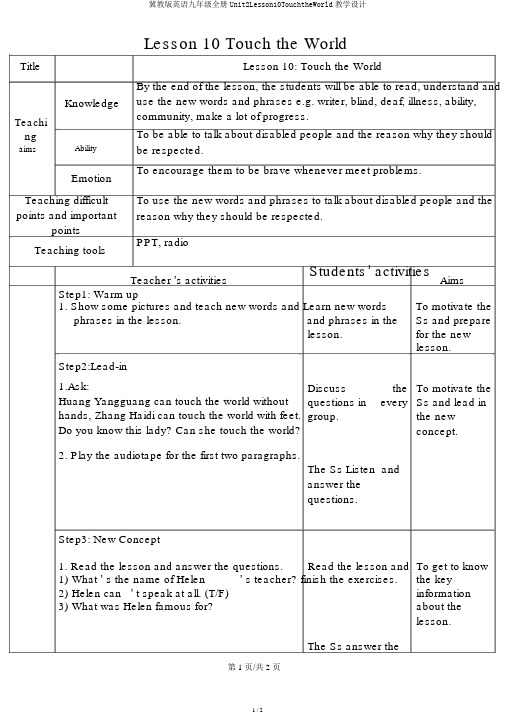
Lesson 10 Touch the WorldTitleKnowledge Teachingaims AbilityEmotion Teaching difficult points and importantpointsTeaching toolsLesson 10: Touch the WorldBy the end of the lesson, the students will be able to read, understand and use the new words and phrases e.g. writer, blind, deaf, illness, ability, community, make a lot of progress.To be able to talk about disabled people and the reason why they should be respected.To encourage them to be brave whenever meet problems.To use the new words and phrases to talk about disabled people and the reason why they should be respected.PPT, radioTeacher ’s activitiesStudents’ activitiesAimsStep1: Warm up1. Show some pictures and teach new words and Learn new words To motivate thephrases in the lesson.and phrases in the Ss and preparelesson.for the newlesson.Step2:Lead-in1.Ask:Huang Yangguang can touch the world without hands, Zhang Haidi can touch the world with feet. Do you know this lady? Can she touch the world?2. Play the audiotape for the first two paragraphs.Discuss the To motivate the questions in every Ss and lead in group.the newconcept.The Ss Listen andanswer thequestions.Step3: New Concept1. Read the lesson and answer the questions.Read the lesson and To get to know1)What ’ s the name of Helen’ s teacher? finish the exercises.the key2)Helen can ’ t speak at all. (T/F)information3)What was Helen famous for?about thelesson.The Ss answer theHome-work 3. Read the lesson again and answer the questionsquestions.independently and To get to know1)How did Anne Sullivan teach Helen Keller?then discuss the the details2)What was the first word Helen Keller learned?answers in groups.about the3)Helen could learn at university by herself.lesson.(T/F)4)Who did Helen help?5)What can you learn from Helen?Step 4: ExerciseFill in the blanks with the correct forms of the The Ss try to fill in To check if words in the box.the blanks with the they grasp thewords and in the main words inlesson.the lesson. Step 5: Group Work1.Show some pictures of famous disabled people. Discuss it in groups To give Ss time2.Talk about them with their group members.and choose one of to practice theirthem to talk in class.speakingabilities.Step6: WritingAsk the Ss to write a short passage about the Write a short To give Ss time disabled people.passage about the to practice their .disabled people.writing1.Finish off the exercises in the lesson.abilities.2.Copy your passage on the exercise book.Lesson10: Touch the worldWords Phrases:Helen: blind, deaf, illness, shout and cryBoard writer make a lot of progress a lotblind After knowing Anne SullivanDesigndeaf Helen: learn, write, speak, study atillness university, visit, help othersabilitycommunity。
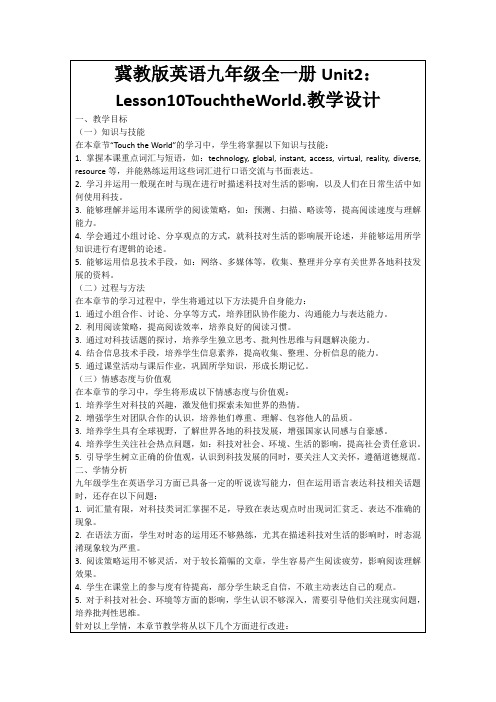
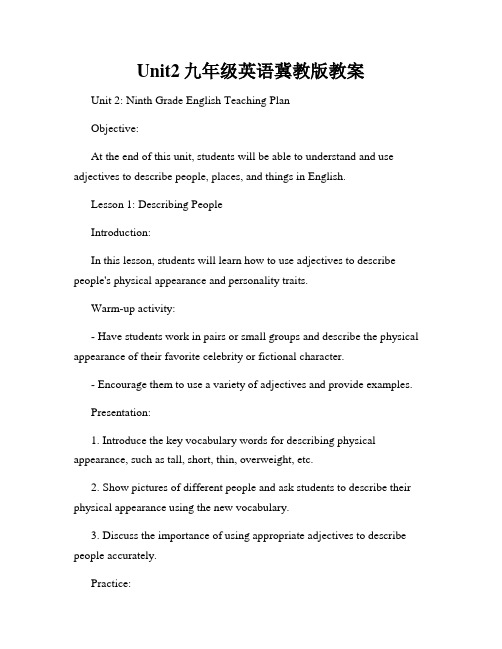
Unit2九年级英语冀教版教案Unit 2: Ninth Grade English Teaching PlanObjective:At the end of this unit, students will be able to understand and use adjectives to describe people, places, and things in English.Lesson 1: Describing PeopleIntroduction:In this lesson, students will learn how to use adjectives to describe people's physical appearance and personality traits.Warm-up activity:- Have students work in pairs or small groups and describe the physical appearance of their favorite celebrity or fictional character.- Encourage them to use a variety of adjectives and provide examples.Presentation:1. Introduce the key vocabulary words for describing physical appearance, such as tall, short, thin, overweight, etc.2. Show pictures of different people and ask students to describe their physical appearance using the new vocabulary.3. Discuss the importance of using appropriate adjectives to describe people accurately.Practice:1. Divide students into pairs and give each pair a set of picture cards depicting various people.2. Have them take turns describing the physical appearance of the people in the pictures to their partner.3. Encourage the use of adjectives and provide guidance as needed.Extension activity:- Have students write a short paragraph describing the physical appearance of a family member or a friend.Lesson 2: Describing PlacesIntroduction:In this lesson, students will learn how to use adjectives to describe different types of places.Warm-up activity:- Display pictures of different places, such as a beach, a city, a forest, etc.- Ask students to brainstorm adjectives to describe each place.Presentation:1. Introduce the key vocabulary words for describing places, such as crowded, peaceful, scenic, etc.2. Show pictures of different places and ask students to describe them using the new vocabulary.3. Discuss how different adjectives can create different impressions of a place.Practice:1. Divide students into small groups and give each group a different picture of a place.2. Have them take turns describing the place to their group members using appropriate adjectives.3. Encourage discussions and comparisons between different places.Extension activity:- Have students write a short paragraph describing their favorite place using descriptive adjectives.Lesson 3: Describing ThingsIntroduction:In this lesson, students will learn how to use adjectives to describe objects and things.Warm-up activity:- Bring in various objects, such as a book, a pencil, a toy, etc.- Ask students to describe the objects using adjectives.Presentation:1. Introduce the key vocabulary words for describing things, such as big, small, colorful, etc.2. Show different objects and ask students to describe their characteristics using the new vocabulary.3. Discuss the importance of using specific adjectives to describe objects accurately.Practice:1. Give each student a small object and ask them to describe it to a partner using appropriate adjectives.2. Encourage students to be creative and use a variety of adjectives.3. Have pairs switch objects and repeat the activity.Extension activity:- Have students bring in an object from home and write a short paragraph describing it using descriptive adjectives.Conclusion:By the end of this unit, students will have developed the ability to describe people, places, and things using adjectives accurately. This will enhance their English language skills and allow them to communicate more effectively.。
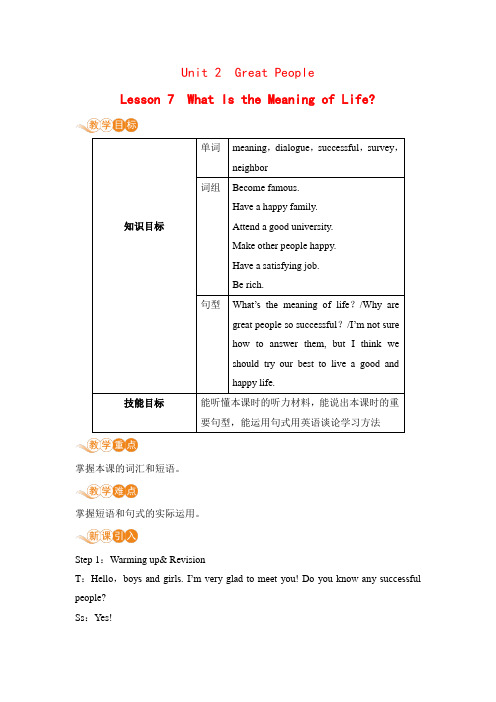
Unit 2 Great PeopleLesson 7 What Is the Meaning of Life?知识目标单词meaning,dialogue,successful,survey,neighbor词组Become famous.Have a happy family.Attend a good university.Make other people happy.Have a satisfying job.Be rich.句型What’s the meaning of life?/Why are great people so successful?/I’m not surehow to answer them, but I think weshould try our best to live a good andhappy life.技能目标能听懂本课时的听力材料,能说出本课时的重要句型,能运用句式用英语谈论学习方法掌握本课的词汇和短语。
掌握短语和句式的实际运用。
Step 1:Warming up& RevisionT:Hello,boys and girls. I’m very glad to meet you! Do you know any successful people?Ss:Yes!T:OK!Please answer my questions. What is success?How do you know if you have succeeded? Please tell me,OK?Ss:Yes!(几个学生起立自由回答,教师把学生的答案写在黑板上)设计意图:此环节通过师生互动导入本单元话题,渲染课堂气氛,激发学生的学习兴趣,消除学生一节课开始的紧张感,为接下来的讨论做准备。
Step 2:Pre-reading1.Teach phrases and practice the sentence patterns教师出示本课单词的图片,导入词汇、短语、句型的学习。

Lesson 2 A Visit to the DentistNavigation of the course(课程导航)Teaching contents1. Mastery words and expressions: refuse, toothache, Germanbe afraid of doing, go to the dentist, right away, have no choice but to do2. Oral words: dentist, rotten, fortunately, headset, achingTeaching aims(教学目标)1. Grasp mastery words and expressions in the lesson2. Enable to talk about going to the dentist3. Teaching important points(教学重点)Grasp mastery words and expressions in the lessonTeaching difficult points(教学难点)Enable s talk about going to the dentistTeaching steps(教学过程设计)Step 1. Warming up: Ask the students to talk about the following questions.Have you ever had a toothache?How do you take care of you teeth?Step 2. Learning new words of the text.New words●refuse v. 拒绝●toothache n. 牙疼●German n. 德国人●dentist n. 牙医●rotten adj. 腐烂的●fortunately adv. 幸运地●headset n. 耳机●aching adj. 疼的Step 3. Listening tasks:Listen twice and do Exercise 1 on Page 5. Then check answers as a class. Tell why it is true orfalse.Step 4. Reading tasks:Read in groups and finish Exercise 2 on Page 5. First discuss in groups, then ask each group to give their answers. Encourage them to use their own words to tell the main idea of each paragraph.Step 5. Explain the language notes to the students.1. I’m really afraid of going to the dentist. 我真的害怕去看牙医。
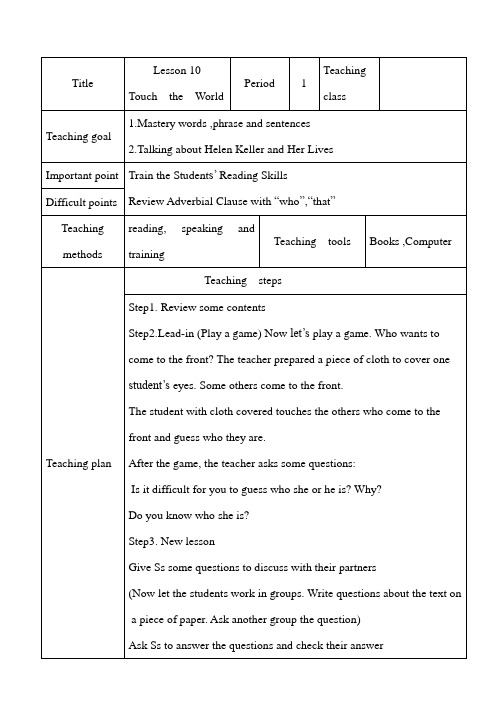
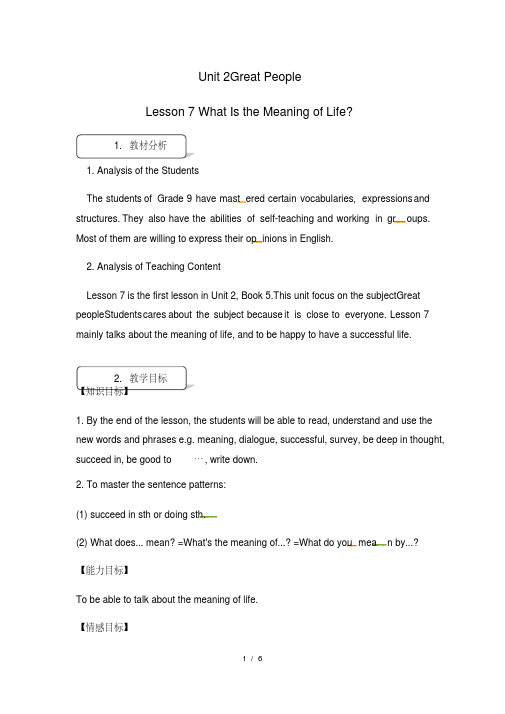
Unit 2Great PeopleLesson 7 What Is the Meaning of Life?1.教材分析1. Analysis of the StudentsThe students of Grade 9 have mast ered certain vocabularies,expressions and structures. They also have the abilities of self-teaching and working in gr oups. Most of them are willing to express their op inions in English.2. Analysis of Teaching ContentLesson 7 is the first lesson in Unit 2, Book 5.This unit focus on the subjectGreat peopleStudents cares about the subject because it is close to everyone. Lesson 7 mainly talks about the meaning of life, and to be happy to have a successful life.2.教学目标【知识目标】1. By the end of the lesson, the students will be able to read, understand and use the new words and phrases e.g. meaning, dialogue, successful, survey, be deep in thought, succeed in, be good to…, write down.2. To master the sentence patterns:(1) succeed in sth or doing sth.(2) What does... mean? =What's the meaning of...? =What do you mea n by...?【能力目标】To be able to talk about the meaning of life.【情感目标】To be happy to have a successful life.【教学重点】To use the new words and phrases to talk about the meaning of life.【教学难点】To use the new words and phrases t o talk abou t the meaning of life. And to behappy to have a successful life.Tape recorder, MultimediaStep 1. Warm-upFree talk: What ’s the meaning of life.Step 2. Presentation1.Introduce some great people in our country (with their pictures).2.Explain “neighbours ”.3.Listen to the passage and tick the sentences mentioned.Become famous.Have a h appy family.Attend a good university.Make other people happy.Have a satisfying job.Be rich.3.课前准备5.教学过程4. Read the lesson and answer the questions. (1)What is Li Ming thinking about?(2)What does Wang Mei think we should do?(3)What doe s Li Ming’s father always say?5. Language points:After the history class,Li Ming sits in the classroom,deep in thought.deep in thought意为“深思,沉思”,还可以用lost in thought表示。
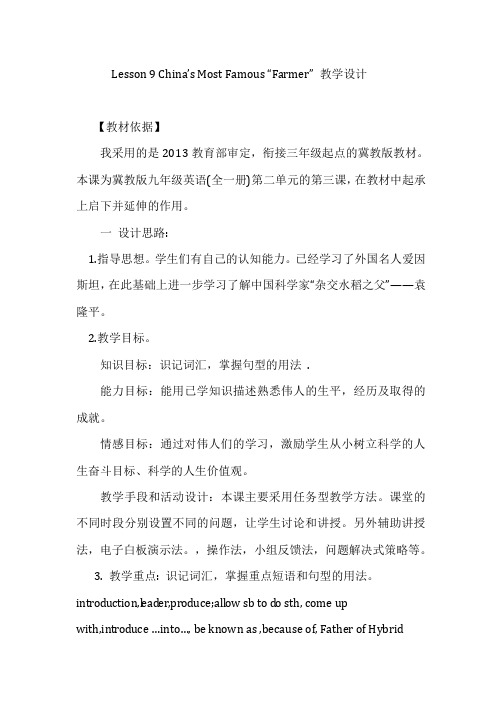
Lesson 9 China’s Most Famous “Farmer” 教学设计【教材依据】我采用的是2013教育部审定,衔接三年级起点的冀教版教材。
本课为冀教版九年级英语(全一册)第二单元的第三课,在教材中起承上启下并延伸的作用。
一设计思路:1.指导思想。
学生们有自己的认知能力。
已经学习了外国名人爱因斯坦,在此基础上进一步学习了解中国科学家“杂交水稻之父”——袁隆平。
2.教学目标。
知识目标:识记词汇,掌握句型的用法.能力目标:能用已学知识描述熟悉伟人的生平,经历及取得的成就。
情感目标:通过对伟人们的学习,激励学生从小树立科学的人生奋斗目标、科学的人生价值观。
教学手段和活动设计:本课主要采用任务型教学方法。
课堂的不同时段分别设置不同的问题,让学生讨论和讲授。
另外辅助讲授法,电子白板演示法。
,操作法,小组反馈法,问题解决式策略等。
3. 教学重点: 识记词汇,掌握重点短语和句型的用法。
introduction,lead er,produce;allow sb to d o sth, come upwith,introduce …into…, be know n as ,because of, Father of HybridRice , since then,together with要求学生应用这些词汇短语造句,根据小组学习情况分配任务,限时完成。
教学难点: 时间状语从句before和after引导的时间状语从句,了解主从时态变化,能完成相应的习题。
二教学准备我本节课主要将采用图片和问题导入,所以会整合有关本课的在线图片,并制作多媒体课件,相关影像资料及录音机,让学生在听说读写中理解课文。
以名人为榜样,激发学生学习兴趣、感悟人生。
三教学过程I.【导入】What is your dream /What do you want to be when you grow up?A scientist in China had a dream when he was a child and he became a great person. Today we will know about him.II.【自主学习】1.预习词汇表中本课单词短语,熟记并默写在导学案上。

Unit 2 Great PeopleLesson 10 Touch the World1. Analysis of the StudentsThe students of Grade 9 have mastered certain vocabularies,expressions and structures. They also have the abilities of self-teaching and working in groups. Most of them are willing to express their opinions in English.2. Analysis of Teaching ContentLesson 10 is the fourth lesson in Unit 2, Book 5.This unit focus on the subject great people. Students cares about the subject because it is close to everyone. Lesson 10 mainly talks about Helen Keller’s lifetime. She became ill but that didn’t kill her. She can touch the world without eyes and ears. Toward the sun as long as they do not see the shadow. --- Helen Keller【知识目标】1. To master the new words: blind, deaf, sight, courage, greatly, Planetary Post,well-known=famous, writer(作家);2. To master the phrases:learn from…, be well-known for = be famous as, at the age of, have a high fever, between…and…【能力目标】Improve their ability of listening, speaking, reading and writing.【情感目标】To be hard work and never give up.【教学重点】Development their ability of listening, speaking, reading and writing.【教学难点】How to use the phrases and structures of sentencesTape recorder, MultimediaStep 1. Warm-upFree talk: How can you touch the world without hands, legs or even the ability to see and hear? Step 2. Presentation1.Introduce Huang Yangguang, Zhang Haidi and Helen Keller2.Show the new words.3.Listen to the tape and tell us true (T) or false (F).(1)Helen Keller is a famous writer and educator.(2)Helen Keller was a hero to healthy people around the world.(3)Helen Keller was born in 1880 in England.(4) A high fever made Helen blind and deaf.(5)When she lost her sight and hearing, she became difficult and wild.4. Language points:at the age of意为“在……岁时”,of后接基数词,有时也可省略为“at+基数词”或“at age+基数词”。

Unit 2Great PeopleLesson 10 Touch the World1. Analysis of the Studen tsThe students of Grade 9 have mastered certain vocabularies,expressions and structures. They also have the abilities of self-teaching and working in groups. Most of them are willing to express their opinions in English.2. Analysis of Teaching ContentLesson 10 is the fourth lesson in Unit 2, Book 5.This unit focus on the subjectgreat people.Students cares about the subject because it is close to everyone. Lesson 10 mainly talks about Helen Keller’s lifetime. She became ill but that didn’t kill her. She can touch the world without eyes and ears. Toward the sun as long as they do not see the shadow. --- Helen Keller1. To master the new words: blind, d eaf, sight, courage, greatly, PlanetaryPost, well-known=famous, w riter(作家);2. To master the phrases:learn from…, be well-known for = be famous as, at the age of, have a high fever, between… and…【能力目标】Improve their ability of listening, speaking, reading and writing.【情感目标】To be hard work and never give up.【教学重点】Development their ability of listening, speaking, reading and writing.【教学难点】How to use the phrases and structures of sentencesTape recorder, MultimediaStep 1. Warm-upFree talk: How can you touch the world without hands, legs or even the ability to see and hear?Step 2. Presentation1.Introduce Huang Yangguang, Zhang Haidi and Helen Keller2.Show the new words.3.Listen to the tape and tell us true(T) or false(F).(1)Helen Keller is a famous writer and educator.(2)Helen Keller was a hero to healthy people around the world.(3)Helen Keller was born in 1880 i n England.(4) A high fever made Helen blind and deaf.(5)When she lost her sight and hearing,she became difficult and wild.4. Language points:at the age of意为“在……岁时”,of后接基数词,有时也可省略为“at+基数词”或“at age+基数词”。

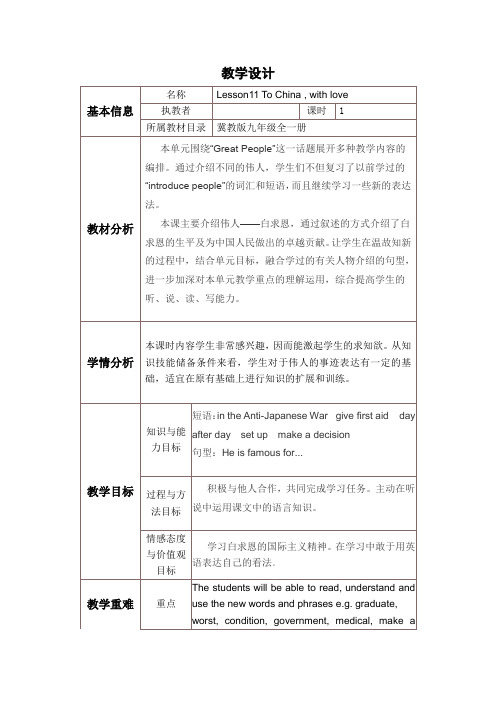
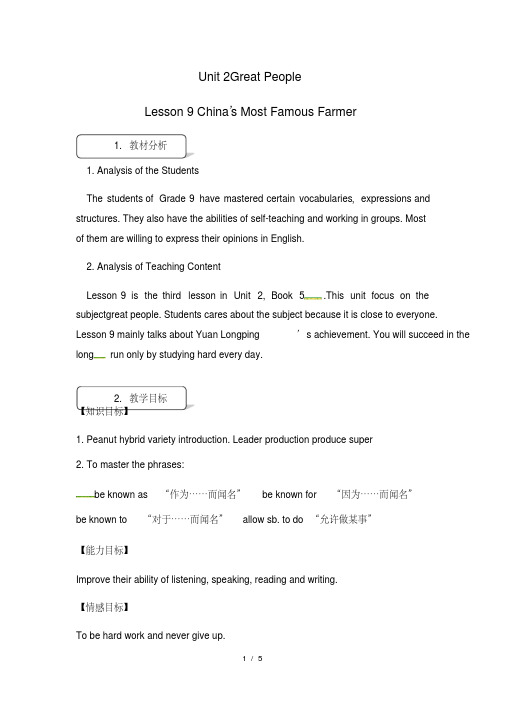
Unit 2Great PeopleLesson 9 China’s Most Famous Farmer1.教材分析1. Analysis of the StudentsThe students of Grade 9 have mastered certain vocabularies,expressions and structures. They also have the abilities of self-teaching and working in groups. Mostof them are willing to express their opinions in English.2. Analysis of Teaching ContentLesson 9 is the third lesson in Unit 2, Book 5.This unit focus on the subjectgreat people. Students cares about the subject because it is close to everyone. Lesson 9 mainly talks about Yuan Longping’s achievement. You will succeed in the long run only by studying hard every day.2.教学目标【知识目标】1. Peanut hybrid variety introduction. Leader production produce super2. To master the phrases:be known as “作为……而闻名”be known for “因为……而闻名”be known to “对于……而闻名”allow sb. to do “允许做某事” 【能力目标】Improve their ability of listening, speaking, reading and writing.【情感目标】To be hard work and never give up.【教学重点】Development their ability of listening, speaking, reading and writing.【教学难点】How to use the phrases and structures of sentences.3.课前准备Tape recorder, Multimedia5.教学过程Step 1. Warm-upFree talk: Say the famous people in China you know.Step 2. Presentation1.Introduce Yuan Longping.2.Free talk: Did you have a dream when you were a child? What was it?Do you think great people work all the ti me and have no other interests at all?3.Explain the new words.4. Read the lesson and write true (T) or false (F).(1)He grew a new type of rice as a child.(2) He had an idea for hybrid rice in the 1960s.(3) He studied agriculture at university.(4) He is working hard on developing super hybrid rice.(5) He plays th e violin for half an hour before he goes to bed.5. Check the answers and underline the key sentences.6. Explain the language points:本句含有由that引导的定语从句。


Lesson 2 A Visit to the Dentist教学设计一、Instructional Analysis1. Analysis of Teaching ContentLesson 2 is the second lesson in Unit 1, Book 5.This unit focus on the subject staying healthy.Students cares about the subject because it is close to everyone. Lesson 2 mainly talks about Wang Mei’s visit to the dentist. It also tells us an old German saying: Fear makes the wolf bigger than he is. It can raise Ss’ interests easily.2. Analysis of the StudentsThe students of Grade 9 have mastered certain vocabularies,expressions and structures. They also have the abilities of self-teaching and working in groups. Most of them are willing to express their opinions in English .二、Teaching Aims1. Knowledge Objects1)To master: toothache, German, have no choice but to do, refuse to do\sb.\sth Fear makes the wolf bigger than he is.2)To understand: dentist, rotten, fortunately, headset, aching, wolf, go to the dentist, have a toothache, right away2. Ability ObjectsTo develop the students ‘abilities of listening, speaking, reading andwriting.3. Moral ObjectsTo encourage the students not to be afraid when they meet some trouble or something difficult. Fear makes the wolf bigger than he is.4. Learning StrategyIndividual learning, working in groups and task-based learning.三.Teaching Important and Difficult Points1. Teaching Important Points:1) To master the important words, phrases and sentences.2) To master the usage of refuse sb\sth\to do, have no choice but to…2. Teaching Difficult Points:To understand the whole lesson and di scuss how to take care of our teeth.四.Teaching Aids:Multi-media五.Teaching ProceduresTeachingProcedure sStep 1 Warming-up (2’) Teacher’s ActivitiesSelf-introduction andgreetings.Students’ ActivitiesGet to know the teacherand try to be active inclass. Get ready for thenew lesson.PurposeEncouragethe Ss to bebrave inclass.Step 2 New words(5’)e to the newlesson . Explain what adentist is. Teach thenew words with thehelp of multi-mediaand some objects.2. Challenge the Ss’memo ry abilities .1.Learn the new wordsbywatching,listening,andreading .dentist,toothache,aching,rotten,fortunately,wolf,headset,German2.Guess the words thathave the same meaningas the circled words.Lead intothe newlesson andget theclass toknowabout someof the newwords in anaturalway.Step 3 Listening(4’)1.Ask the Ss to listento the text with fourquestions. Play thetape once.2. Check the answers.Listen to the textcarefully and fill in theblanks.Train theSs’ theability oflistening.Step 4 Reading forknowledg e (13’)1.Ask the Ss to readthe text quickly andwrite T or F. Thencheck the answers.2.Ask the Ss to readthe text carefully andfinish the given taskson the learning paper.3.Lead the Ss to getsome reading tips.Encourage them toguess the meaning ofthe new word refuse.Then check theanswers in pairs.1. Read the text quickly.Then write down theiranswers. They need tofinish the task alone.2.Read the text againcarefully and finish thegiven tasks.3.Try to summarizesome reading tips.Guess the meaning ofthe new word refuse inthe text.Train theSs’ abilityof reading.Mastersomereadingskills.Step 5 Learning in groups (10’)1.Divide the Ss intoseveral groups.2.Learn the text bythemselves.Ask them to finishthree taskson the learning paper.3. Explain theproblem s they can’tunderstand.e.g.: How to userefus e/have no choicebut to do.1.Each group leaderorganize the learning.2.They need to find andlearn the importantphrases and sentencesby heart.3.When they meet somedifficulties, they candiscuss in groups or askthe teacher for help.4.Sum up the usage ofrefuse/have no choicebut to do.5.Match each paragraphwith its main idea.1.Train thestudents’ability ofcooperative learning.2.Encourage the Ss notto be afraidofdifficultiesin learning.Step 6 Discussio n (5’)1.Encourage the Ss todiscuss: How shouldwe take care of ourteeth?2.Ask several studentsto share their opinionsFirst, the Ss have adiscussion in groups,then some volunteerscan share their opinionswith the class.1.Train theSs’ abilityof speaking2.Realizetheimportancewith the class.3.The teacher expresses her opinion. of taking care of teeth.Step 7Summary(4’)1.Ask the Ss tosummarize whatthey’ve learned inclass.2.Make a shortsummary. When youface trouble orsomething difficult,don’t be afraid. Fearmakes the wolf biggerthan he is.3.Ask the Ss to relax:enjoy a song.1.Summarize what theyhave learned in thislesson by themselves.2.Enjoy a popular songTrouble is a friend.1.Cultivatethe Ss’good habitsofsummarizing afterlearningsomething.2.Encourage the Ss tobelieve inthemselvesin front ofthedifficultiesor trouble.Step 8 Homewor Ask the Ss to write apassage namedWrite a passage :If you are a dentist, canTrain theSs’ abi lityk(2’)Healthy teeth, healthybodyyou give us someadvice on how to takecare of our teeth?of writing.六、Blackboard DesignLesson 4 A Visit to the Dentistrefuse sb.\sth.\to dohave no choice but to do sth.Fear makes the wolf bigger than he is.七、Teaching reflection_______________________________________________________ ____________________。
Unit 2 Great People
Lesson 7: What Is the Meaning of Life?
I. Learning aims:
Master the new words:
meaning, dialogue, successful, survey, neighbour
II. Learning important and difficult points:
1) Those are all really important questions and very difficult to answer.
2) I’m not sure how to answer them.
3) My dad always says that we should be good to others.
4) Let’s write these questions down.
Language Points:
1. meaning
【用法】作可数名词,意为“意思”,是动词mean的动名词形式起形容词作用。
【举例】Can you tell me the meaning of this new word? 你能告诉我这个生词的意思吗?
2. Those are all really important questions and very difficult to answer. 那些都是很重要的问题并且很难回答。
【用法】句式“be + 形容词+ 不定式”意为“很……做某事……”。
【举例】This kind of work is easy to complete. 这种工作很容易完成。
3. I’m not sure how to answer them. 我不能肯定如何回答它们。
【用法】不定式可以与疑问词 who, what, which, when, how, where 等连用,构成不定式短语,在句中作主语、表语、宾语和宾语补足语等。
【举例】①Where to buy this kind of computer is a problem. 到哪里去买这种计算机是一个问题。
(作主语)②I really don’t know what to do.我的确不知道该怎么办了。
(作宾语)③The question is how to get there. 问题是怎么到那里去。
(作表语)④Can you tell me which one to choose? 你能告诉我该选择哪一个吗?(作
宾语补足语)
4. My dad always says that we should be good to others. 我父亲总说我们应该对别人好一些。
【用法】句式be good to somebody 意为“对某人态度友好”。
类似句式还有:be polite to, be friendly to, to kind to, be nice to, be rude to等。
【举例】His classmates are all friendly to him. 他的同学们对他很友好。
Lesson 8: A Universe of Thought
I. Learning aims:
Master the new words:
universe, Albert Einstein, lifetime, solve, theory, relativity, Switzerland, pioneer, Nobel, Princeton, nuclear, weapon, conclusion, false
II. Learning important and difficult points:
1)Einstein is most famous for his Theory of Relativity.
2)For one of those articles, he received the Nobel Prize in 1921.
3)The important thing is not to stop questioning.
4)Anyone who has never made a mistake has never tried anything new.
Language Points:
1. solve
【用法】作及物动词,意为“解答、解决”,后加名词或代词作宾语。
【举例】I don’t think I can solve these problems. 我想我不能解决这些问题。
2. Einstein is most famous for his Theory of Relativity. 爱因斯坦为他的相对来说最为出名。
【用法】句式be famous for 意为“因……而著名、出名”,后加表示物的名词、代词作介词for的宾语。
【举例】Hangzhou is famous for tea and silk. 杭州因茶和丝绸而出名。
【拓展】句式be famous as意为“作为……而著名、出名”;后加表示人的名词、代词作介词as的宾语。
【举例】Yang Liping is famous as a dancer. 杨丽萍作为舞蹈演员而出名。
3. The important thing is not to stop questioning. 最重要的事情是不要放弃提问。
【用法】这句话中的not to stop questioning 是动名词的否定形式,它由否定副词not 加上动名词构成。
在这句话中,动名词用在系词后作表语。
【举例】①He is worried about not going to the concert. 他担心的是不能参加音乐会。
②To us students, the first task is studying hard. 对我们学生来说,第一个任务就是努力学习。
Lesson 9: China’s Most Famous “Farmer”
I. Learning aims:
Master the new words:
universe, Albert Einstein, lifetime, solve, theory, relativity, Switzerland, pioneer, Nobel, Princeton, nuclear, weapon, conclusion, false
II. Learning important and difficult points:
1)Einstein is most famous for his Theory of Relativity.
2)For one of those articles, he received the Nobel Prize in 1921.
3)The important thing is not to stop questioning.
4)Anyone who has never made a mistake has never tried anything new.
Language Points:
1. produce
【用法】作及物动词,意为“出产、生产”,是后加名词或代词作宾语。
【举例】Our factory produces radios and televisions. 我们工厂生产收音机和电视机。
【拓展】product是produce 的名词形式,意为“产品”。
【举例】This kind of product sells well. Is that so? 这种产品很畅销。
是这样吗?
2. In the dream, he grew a new type of rice that was as big as a peanut. 在梦中,他种了一种想花生一样大的水稻。
【用法】句式as…as…表示程度相同,第一个as是副词,后加形容词或副词的原级。
【举例】①Jim is as honest as Billy. 吉姆和比利一样诚实。
②She works as carefully as her sister. 她和她姐姐工作一样认真。
【拓展】句式not as (so) …as 表示一方不如另一方。
【举例】①The weather in Beijing is not as (so) hot as that in Wuhan. 北京的天气不如武汉的天气热。
②I don’t run as (so) fast as you. 我不如你跑得快。
3. Since then, he has spent much of his time researching and developing new varieties. 从那时起,他花费很多时间研究和开发新品种。
2。